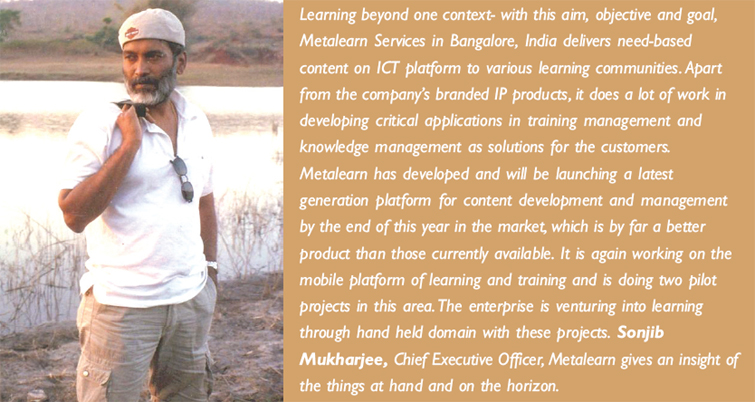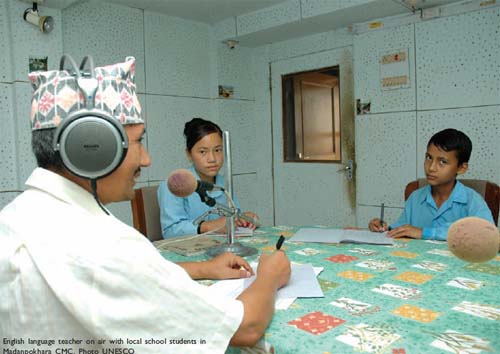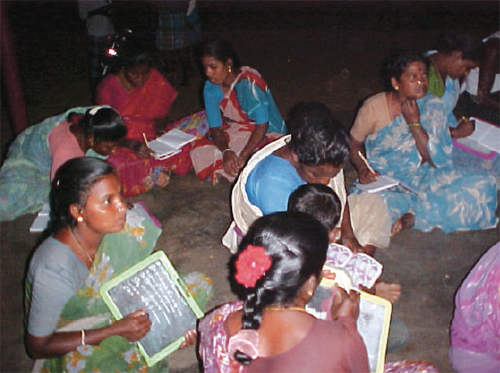
What took learning to be named as Metalearn by you? Please tell us about how and from where did you start your journey towards Metalearn.
 Meta is a terminology that is analogous to the IT industry today. Meta means beyond in one context. The idea here is that learning will move beyond the usual practices into new domain and experiences for all users with technology as the great enabler. As dynamic learning environments emerge and demands from users evolve, IT and ICT will meet these new challenges continuously in the global context.
Meta is a terminology that is analogous to the IT industry today. Meta means beyond in one context. The idea here is that learning will move beyond the usual practices into new domain and experiences for all users with technology as the great enabler. As dynamic learning environments emerge and demands from users evolve, IT and ICT will meet these new challenges continuously in the global context.
Metalearn was founded in 2003 with the singular objective of taking the user experience in learning beyond the contemporary into the future. The axiom that we follow from day one is to create better access, availability and affordability of learning for all.
What is the real focus of Metalearn- academic or enterprise e-learning? If both, then in terms of reaching the target who comes first?
We do not essentially differentiate between users in terms of pure experience of joy and usability between academic and enterprise learning. These are business sectors defined by user demands of different kind. At the end it's the user experie-nce that counts and we have built our competence equally in both sectors.
 In terms of reaching the target, the need has been quite clearly defined by the enterprise learning users already in the market and our reach potential is the highest today in this sector. However, the fact remains that in the long run the volume and industry challenges are bound to be much greater in the academia and the scenario will dramatically change in the coming two to three years.
In terms of reaching the target, the need has been quite clearly defined by the enterprise learning users already in the market and our reach potential is the highest today in this sector. However, the fact remains that in the long run the volume and industry challenges are bound to be much greater in the academia and the scenario will dramatically change in the coming two to three years.
How do you see the Global market of e-Learning? Which sector of the market (K-12, higher education, corporate learning etc) do you think will see the maximum growth in the next few years?
The corporate e learning sector is seeing certain amount of standar-disation and consolidation in terms of process and practices already and is growing faster than the education sector in terms of specificity and ROI. But the education sector on the whole has a much larger and wider potential in terms of growth and in sheer spend terms will be way ahead of the corporate sector by 2010 globally.
Adventus seems to be the most viable product of your company. How flexible are your products in delivering content enterprise wide.
We have two pure technology IP products in the stable, Adventus and Metatest. Both these products have been widely accepted by users worldwide and after a successful debut in the Indian market we now receive a high level of demand from the global market as well. These are leading brands in LMS and Test Engine today coming out of India in the world market. The products are capable of high level of robust and scalable deployments and can meet complex solution architectures for delivering learning across thousands of users in diverse environments.
Your products are better recognised as bridging the cost gap. Please justify. Does that mean you target primarily to small and medium enterprises?
You are absolutely right. We offer a large cost advantage compared to other global brands and learning officers worldwide and university budget committees love our packages. It was a conscious decision on our part to keep prices affordable in keeping with our view of access, availability and affordability. This of course means that large segments of the SME everywhere become our customers automatically. The potential of the SME cannot be undermined in the learning business today since in the global process of ancillarisation the SME sector is one the largest consumers of learning.
What have been your organisation's achievements in this line? Do you think you have made a mark in this sector? How?
 Our biggest achievement has been to break the price barrier with global quality. In three years we work with leading companies of the world, and provide complex solutions to their learning needs, operate and lead with brands and believe that we have shown what it takes to be a global player despite being small and Indian.
Our biggest achievement has been to break the price barrier with global quality. In three years we work with leading companies of the world, and provide complex solutions to their learning needs, operate and lead with brands and believe that we have shown what it takes to be a global player despite being small and Indian.
We attribute this largely to the fact that we are an open organisation and our teams love the work they do. We follow standard benefit norms but have very low attrition.
What has been the critical roadblock that Metalearn has crossed to be where it is now?
Our major challenge has been to compete globally. And trust me, India is quite a global market. One who succeeds in India can succeed globa-lly. It was a very tough route to take but we could crack it in two years. Today we enjoy references from our customer global MNCs in India to their headquarters back home. This is big for us. The response from the global market to our products and services is huge. We have just kicked off Metalearn US based in Florida USA. The critical roadblock was to match investments with global scaling. This could break our back but we are through all that.
As the CEO, where do you see Metalearn five years from now?
By 2010, we will be the most reputed e-learning company out of India globally with highest profitability. This India part is important to us because as an Indian company we have the potential to produce best quality work in learning technology and we will pursue this continuously to give better access, availability and affordability to learning. We will be more of a practice, more of a specialist and a knowledge house rather than a super large producer of elearning.









 Madanpokhara community multimedia centre (CMC) in Palpa is an outstanding example of rural based community access in Nepal and South Asia. Community Multimedia Centres (CMCs) promotes community empowerment and addresses the digital divide by combining community broadcasting (community radio and TV) by local people in local languages with the Internet and related technologies. The CMC here combines community radio in local language with telecentre facilities. The main goal of the radio station is to contribute to local development by promoting public awareness and dialogues, knowledge sharing, good governance, community participation and local culture and positive entertainment. It is run, managed and controlled by the media committee comprising of various community people engaged in development works.
Madanpokhara community multimedia centre (CMC) in Palpa is an outstanding example of rural based community access in Nepal and South Asia. Community Multimedia Centres (CMCs) promotes community empowerment and addresses the digital divide by combining community broadcasting (community radio and TV) by local people in local languages with the Internet and related technologies. The CMC here combines community radio in local language with telecentre facilities. The main goal of the radio station is to contribute to local development by promoting public awareness and dialogues, knowledge sharing, good governance, community participation and local culture and positive entertainment. It is run, managed and controlled by the media committee comprising of various community people engaged in development works.  According to local District Education Office (DEO), Palpa district pass percentage in 2005 School Leaving Certificate examination was a dismal 26.43%. In 2004 only 38% of the total 2,16,303 examinees managed to pass. An analysis of the figures shows that students from ethnic, dalit and backward communities predominate among the failures. Compared to other South Asian countries, the SLC failure rate in Nepal is very high, the average of five year results in the Palpa district being as low as 40%.
According to local District Education Office (DEO), Palpa district pass percentage in 2005 School Leaving Certificate examination was a dismal 26.43%. In 2004 only 38% of the total 2,16,303 examinees managed to pass. An analysis of the figures shows that students from ethnic, dalit and backward communities predominate among the failures. Compared to other South Asian countries, the SLC failure rate in Nepal is very high, the average of five year results in the Palpa district being as low as 40%.  The programme effectively reaches to over 27 village development committees (VDC) and Tansen Municipality covering over 7 lakh potential audience. According to DEO fifteen thousand students of sixty high schools in the region directly benefits from the programme. Madanpokhara CMC has also extended its network with the establishment of four telecentre facilities in the government run schools. The telecentre facilities in the schools are used for basic computing training, digital content production and accessing the educational programme for students studying in class eight, which will be later followed by class nine and ten. The recorded educational programmes are archived in the form of digital library in each of these telcentres. The students and teachers use the telcentre facilities in listening to previous day's education content and discuss about the programme. It is particularly useful for students and teachers who miss out during the broadcasting time. This education programme has become the part of the school curriculum in these four centres. The telecentre facility also helps the programmer get the immediate feedback<
The programme effectively reaches to over 27 village development committees (VDC) and Tansen Municipality covering over 7 lakh potential audience. According to DEO fifteen thousand students of sixty high schools in the region directly benefits from the programme. Madanpokhara CMC has also extended its network with the establishment of four telecentre facilities in the government run schools. The telecentre facilities in the schools are used for basic computing training, digital content production and accessing the educational programme for students studying in class eight, which will be later followed by class nine and ten. The recorded educational programmes are archived in the form of digital library in each of these telcentres. The students and teachers use the telcentre facilities in listening to previous day's education content and discuss about the programme. It is particularly useful for students and teachers who miss out during the broadcasting time. This education programme has become the part of the school curriculum in these four centres. The telecentre facility also helps the programmer get the immediate feedback< 
 Meta is a terminology that is analogous to the IT industry today. Meta means beyond in one context. The idea here is that learning will move beyond the usual practices into new domain and experiences for all users with technology as the great enabler. As dynamic learning environments emerge and demands from users evolve, IT and ICT will meet these new challenges continuously in the global context.
Meta is a terminology that is analogous to the IT industry today. Meta means beyond in one context. The idea here is that learning will move beyond the usual practices into new domain and experiences for all users with technology as the great enabler. As dynamic learning environments emerge and demands from users evolve, IT and ICT will meet these new challenges continuously in the global context. In terms of reaching the target, the need has been quite clearly defined by the enterprise learning users already in the market and our reach potential is the highest today in this sector. However, the fact remains that in the long run the volume and industry challenges are bound to be much greater in the academia and the scenario will dramatically change in the coming two to three years.
In terms of reaching the target, the need has been quite clearly defined by the enterprise learning users already in the market and our reach potential is the highest today in this sector. However, the fact remains that in the long run the volume and industry challenges are bound to be much greater in the academia and the scenario will dramatically change in the coming two to three years. Our biggest achievement has been to break the price barrier with global quality. In three years we work with leading companies of the world, and provide complex solutions to their learning needs, operate and lead with brands and believe that we have shown what it takes to be a global player despite being small and Indian.
Our biggest achievement has been to break the price barrier with global quality. In three years we work with leading companies of the world, and provide complex solutions to their learning needs, operate and lead with brands and believe that we have shown what it takes to be a global player despite being small and Indian. 

 Learning as fun: The family's support
Learning as fun: The family's support  The family and VKC share the responsibility of providing favorable learning environment for the learn
The family and VKC share the responsibility of providing favorable learning environment for the learn











